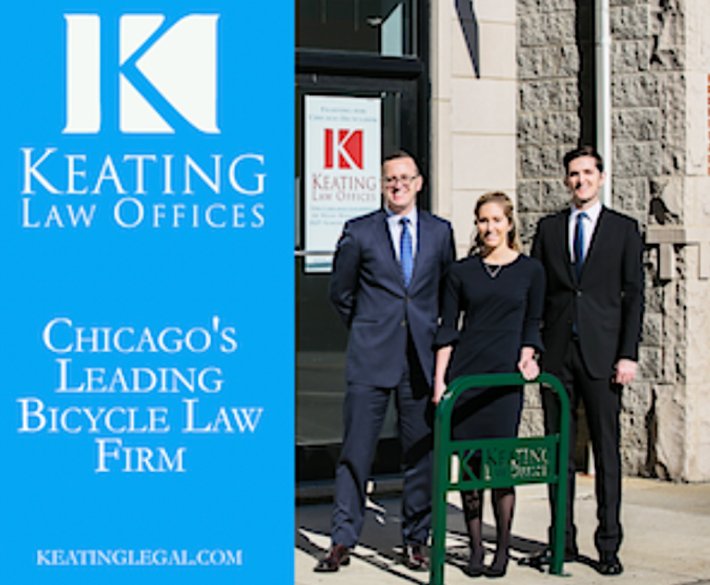
Recently Ald. Andre Vasquez of the Far North Side's 40th Ward sat down with Streetsblog to discuss transportation issues during the City Council member's weekly Ward Night at his West Ridge office. SBC previously ran a transcript of most of our discussion about Ald. Daniel La Spata's (1st) proposed ordinance to lower Chicago's default speed limit from 30 mph to 25, a safer speed, which the Council voted down last month. Here's a bit more on that subject, plus a few other hot topics that Streetsblog readers should find interesting. But please don't take one exchange, about whether transit-friendly billionaire Governor JB Pritzker could personally foot the bill to address Chicagoland's approaching $770 million public transportation budget gap, too seriously.
JG: I think Ald. La Spata said it would only be only, like, a million dollars to [change the speed limit signs to 25 mph], which doesn't seem like a lot.
AV: It doesn't seem like a lot, but for colleagues where this isn't a priority, it seems like, "Hey, we got so many other things to spend on." That's the same way they're looking at Plow the Sidewalks, is they're going, "Hey, it's a noble cause, but it's not even our one through ten things we got to work on in the city. So putting more money towards that, I think, is where a lot of people were hesitant. And I say that as somebody who's in support. There's a methodology to get people on board that I think could have been better followed.
JG: Yeah, you spoke very well [before the 25 mph Council vote]. What you said was right on, just that opponents tend to say, "Oh, look at all the financial hardship this is going to cause people." But right now, traffic crashes are doing so much harm to these communities as it is, and they're very expensive as well.
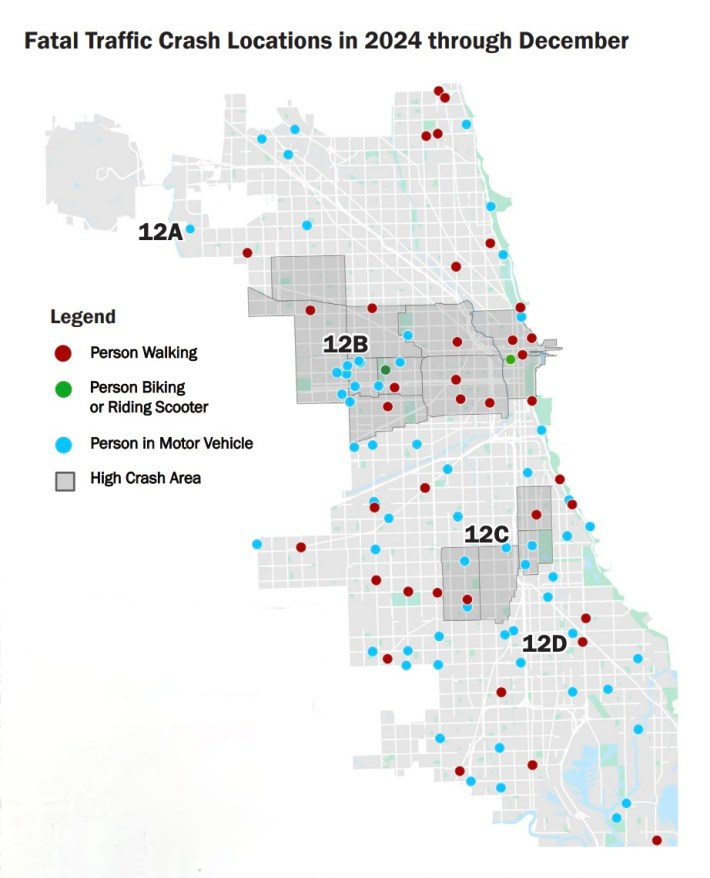
AV: I think that's part of the reason too. A lot of South and West Side alders were the ones who were not for it. I think this is why I pushed back on the map that you guys had, because I felt like causation isn't correlation. [Read about that previous disagreement here.] And if you look at the same map and the South and West side areas, those neighbors also don't view it as a priority, because they've got other public safety issues. Violent crime is probably top of mind. So if those neighbors aren't as vocal as like some of the North Side, those alders are never gonna feel like it's a priority, because those other things are rising to the top.
Similarly with the train system. What I said to organizers is you've got to spend time on the South and West sides with no shortcuts, and build up the support from neighbors on the ground, in a way that will move people that are elected there.
JG: You're talking about addressing the fiscal cliff? [State legislators need to vote for additional funding to fill the looming $770 million total Chicagoland transit budget gap before the spring legislative session ends in May, if order to avoid massive service cuts next year.]
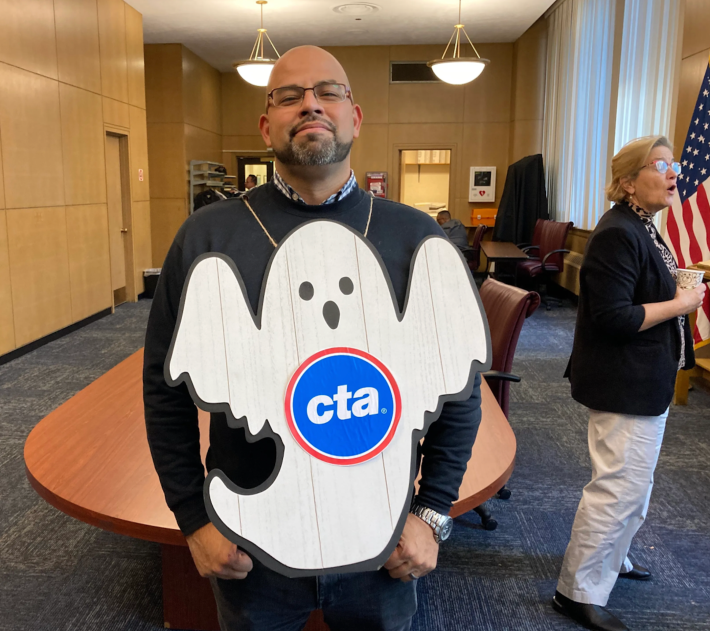
AV: Right, talking about the fiscal cliff or just improvements, because it was just [recent CTA President Dorval Carter] back then. If you didn't get people who lived in those areas who understood that they could actually voice that and they can prioritize in a way that will be the change, you're never going to hear from the ground if you're an elected over there. They're going to talk about shootings or empty storefronts, those rise to the top more than like lowering the speed limit or public transit would.
So in order to get people to more vocalize it, you need organizers building that on the ground in those neighborhoods, so that it is loudly coming from the actual public. Or else they do what they did here and with transit, they go, "It's a bunch of white people from the North Side" trying to holler [about] what they should be doing.
JG: You know, it's funny because [conservative Southwest Side Ald. Ray Lopez (15th)] basically said that [about the speed limit change]. And then I just broke it down and said, "Look at the voter roll – most of the people who voted for this are not non-Hispanic whites."
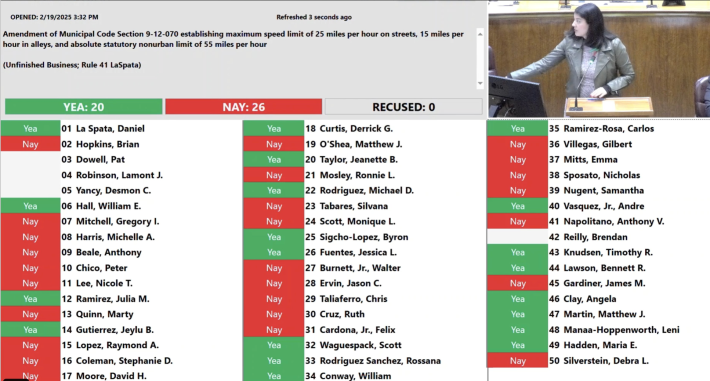
AV: Yeah, but when you look at the the maps, people may not necessarily be against it, it's just not top of mind. So you have to have a concerted, intentional campaign to make it top of mind in neighborhoods where it's not. So, thankfully, that's not really from a no to a yes. It's more like, hey, yes, and here's something you can do about it.
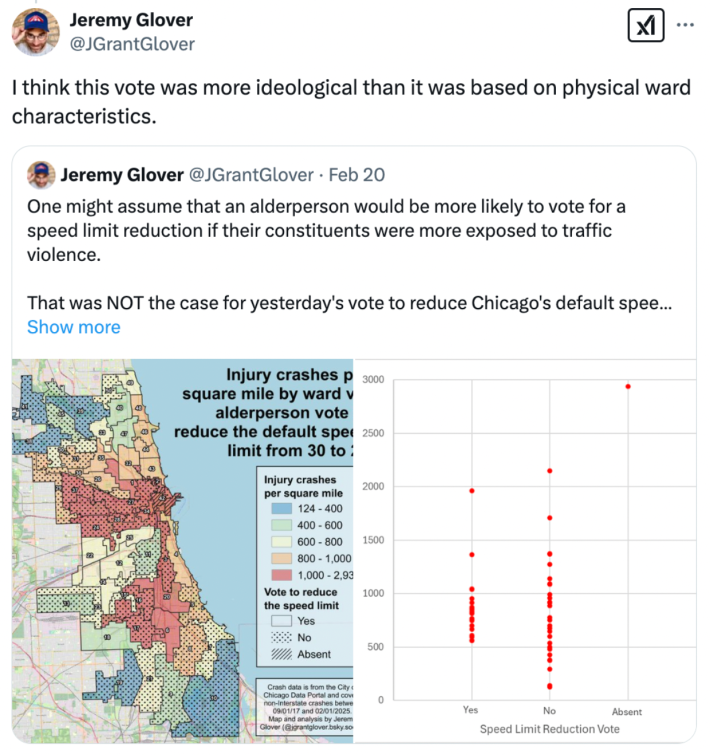
JG: So have you got any upcoming sustainable transportation projects you're excited about?
AV: I think we're trying to figure out what's next with Bus Rapid Transit. [Most alders on Western Avenue have endorsed creating BRT on that street.] We pushed to get the study. They agreed on five streets. We're waiting to hear what's next. I think that's important. I think we want to find out who the next president of CTA is going to be, and really see what a process looks like. And I don't feel the most confident about that will get decided, but I think we need a transparent process identified who the next one can be.
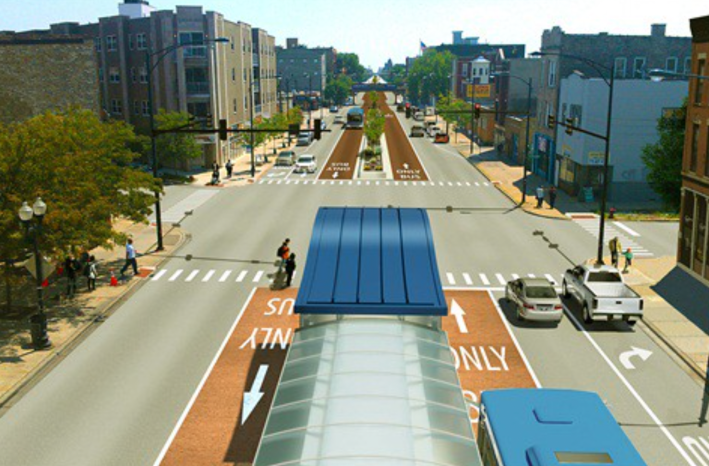
JG: It seems like Acting CTA President Nora Leerhsen is pretty good. Have you gotten a chance to meet with her or anything? I mean, you were the main critic of Dorval Carter, so you should.
AV: Not yet, because I'm mindful the fact that someone stepping up in a new should get a learning curve and a period of grace. So rather than just automatically jump in on something, it's more like, "Are your legs underneath you? When are we having our next hearing?" and then kind of start from there in the conversation. Because it's fair, when you've got a new leader that they have the ability to actually make sure the shoe fits before they can start moving forward.
JG: It seems like a couple of good things have happened recently, like they announced more Blue Line frequency. We'll see whether or not that actually happens.
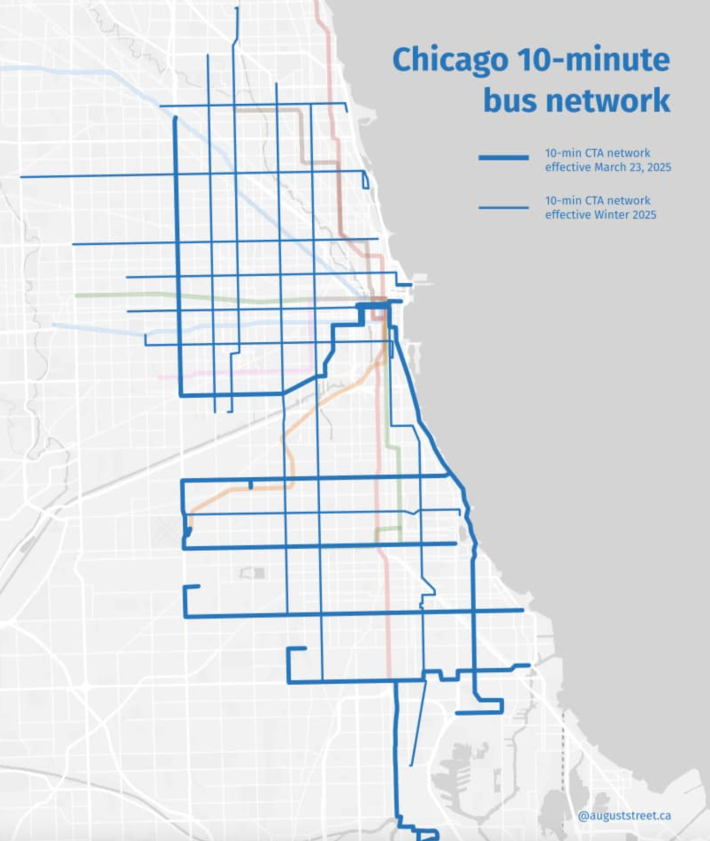
Yesterday [March 23], I was checking out bus frequency on the Cicero line, the #54, because yesterday was the launch of new ten-minute service on eight of South and West side lines, and then more coming to other parts of town. So that seemed pretty good. I mean, there were some weird waits. There were some some bunching. But at least the ones leaving from the station, the southern station at 24th and Cicero, I guess there was like a supervisor there, so they were all leaving exactly at the 10 minute point. But it's hard to maintain that consistent frequency if you don't have bus-only lanes, because it's too easy to get caught in traffic.
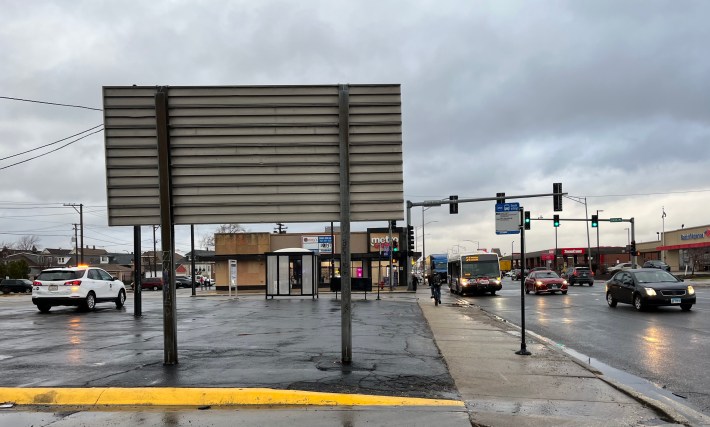
AV: Yeah, there's certainly gonna be stuff that they're in control of, and stuff that they're not. Taking that under consideration makes sense.
But although they're willing to do the 10 minutes now, the fiscal cliff is the fiscal cliff. And I they're trying to identify, one, are the agencies going to consolidate in a way that leads to funding in a more fulsome manner? So we're kind of watching to see what happens in Springfield too. It's a good opportunity to actually come together as one system.
JG: Man, I hope they do something soon. Because I don't know if you saw the reports about the Regional Transportation Authority's doomsday scenario...
AV: 40 percent cut or something like that is what they said?
JG: Yeah, something along those lines. But it was just really bad.
AV: There's an opportunity right now for the state to actually consolidate, in a way that I don't think could have occurred under different mayors, and so I think they've got an opportunity to actually make it happen.

JG: This is a crazy idea, and I'm sure that this can't be legal. I'm sure politicians can't just throw down a lot of money in order to make everybody love them, But [Governor JB] Pritzker is worth $3.7 billion and [transit advocates] want $1.5 billion to fill the [upcoming Chicagoland public transportation budget] void, and also just improve the system. There's no way a billionaire can just like, say, "Hey, I'm going to write you a check for this."
AV: If you're worth $3.7 billion, that's not just money sitting in a safe like Scrooge McDuck. Or it's tied up around a number of things. So I'd imagine the access to that amount of money to just drop half of it wouldn't be a thing.
JG: I'm just wondering, would it even be legal? I mean, it seems like that would be an easy way to buy the vote if everyone thinks, "Oh, he's the Santa Claus who fixed the transit system."
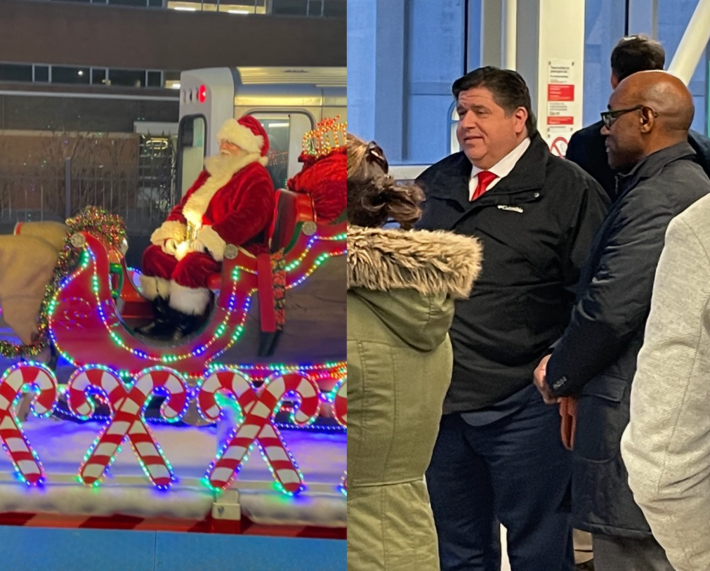
AV: It's hard again, because you've got so many competing priorities and so many constituencies. What may feel like a slam dunk to the constituencies who prioritize [transit] would look like a slap in the face to others.
JG: Yeah, probably some people would say, "Well, why didn't you spend that $1.5 billion on gun violence."
AV: Or homelessness, right? So I think I just don't think it's a feasible idea that someone could just kind of come in and save it that way.
JG: Yeah, I guess it works much better if you can just, like, raise the money.
AV: Or just really figure out ways to make these changes, and I do think that if you consolidate the systems, then there's more skin in the game for the state to connect suburbs all across Illinois to Chicago in a way that helps us go to all the suburbs and kind of offer more fluid motion, and actually would improve the economy, improve the workforce. There's a lot of favorable outcomes, if it's all viewed as one system that kind of talks to itself.
JG: One of the big hurdles they've got to get past, and people from different collar counties kept talking about this, but they're afraid that if they shrink the number of [transit agency] board members, that Chicago will dominate, and they'll get cut out.

McHenry and Kane county officials at last month's Illinois State Senate committee meeting on the Metropolitan Mobility Authority act. Photo: Cameron Bolton
AV: And the Chicago spheres [say] the exact opposite. They don't get as many [board members] as they want. So the details are about how board would be shaped to balance it out. And I think that the State's got a lot of money. We're asking them for support, so something that's fair makes sense. And I think it would be something where Chicago's not the one driving all of it, but there would be some considerable weight that Chicago would have because of the amount that it generates.
JG: So the state is not in debt like Chicago is [with a roughly $1 billion deficit]?
AV: They've got a deficit. [In February, Gov. Pritzker proposed ways to address an over $3 billion deficit in the State's 2026 budget.] So we're all dealing with the same kind of problems.
JG: So when you said they have a lot of money, what do you mean?
AV: They've got more ability to tax different things in a way to raise revenue. And there might be ways where there's a shared mutual interest in raising certain revenues. Okay, they've also got more money generally to play with than we do, as they're kind of figuring out their budgets.
JG: Is there anything else that want to tell me about real quick that's going in the ward?
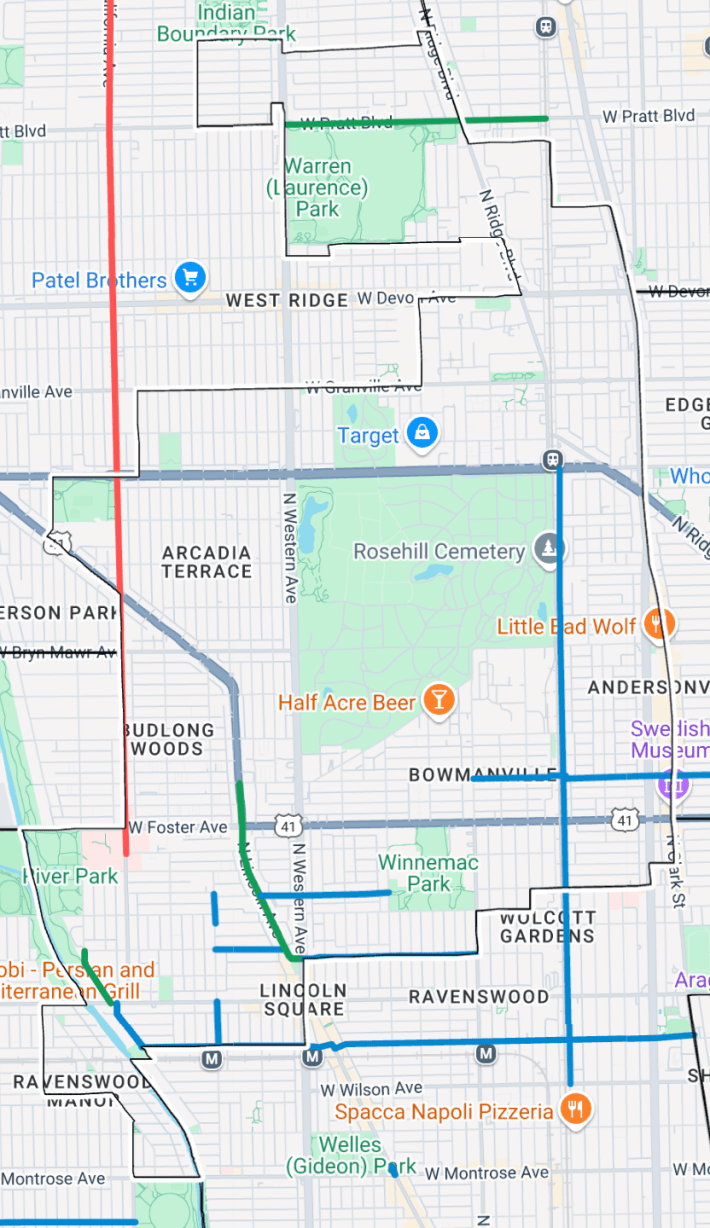
AV: Just trying to get all the bike lane stuff finished. Lincoln Avenue's [streetscape project with protected and raised bike lanes] is getting done, I think, by the end of the season. It'll be from Western to Berwyn. Granville [between Kedzie Avenue to Sheridan Road]. We're looking at the traffic diversion happening there. Pratt [between Western to Ridge avenues] is gonna have a protected bike lane added. So I think we're gonna be close to finished on what our section of the Bike Grid would look like. It's the section by Warren Park. It's actually happening right now, so it should be done by the end of season.
JG: Great. Well, maybe I should let you get back to your constituents, but thanks for your time.
AV: Thanks for stopping by.

Did you appreciate this post? Streetsblog Chicago is currently fundraising to help cover our 2025-26 budget. If you appreciate our reporting and advocacy on local sustainable transportation issues, please consider making a tax-deductible donation here. Thank you!




